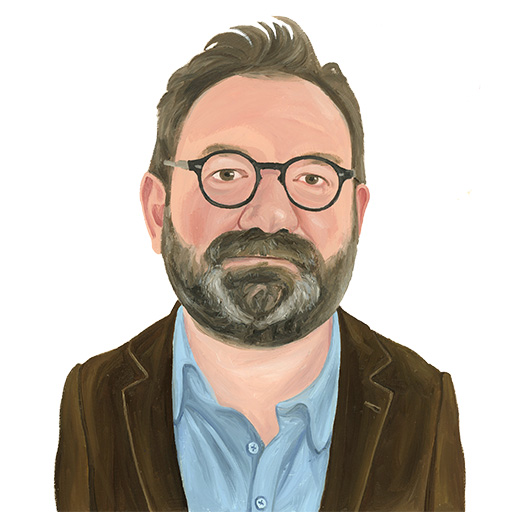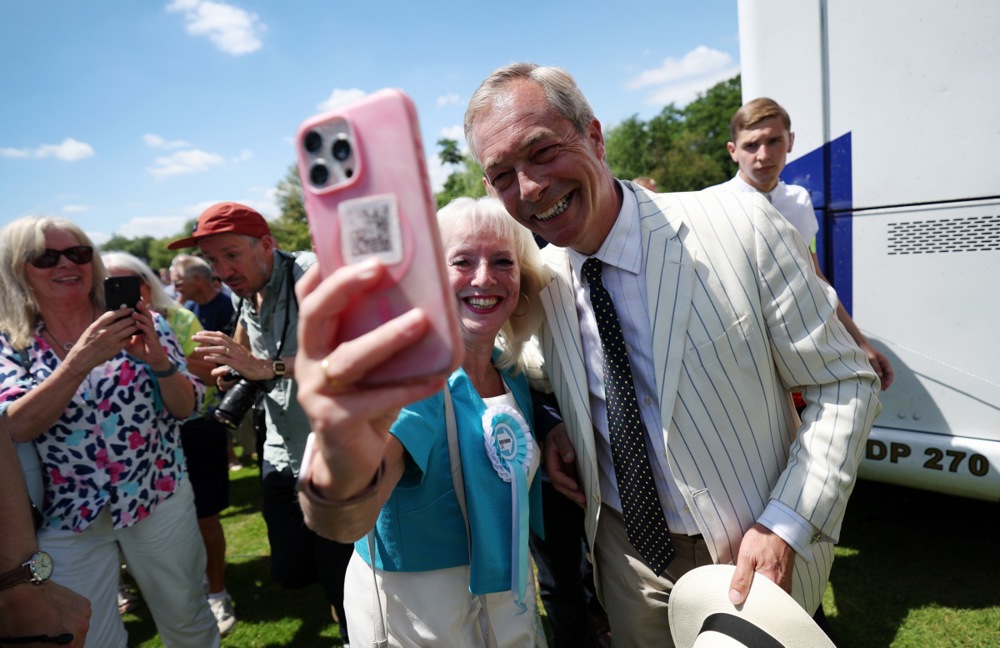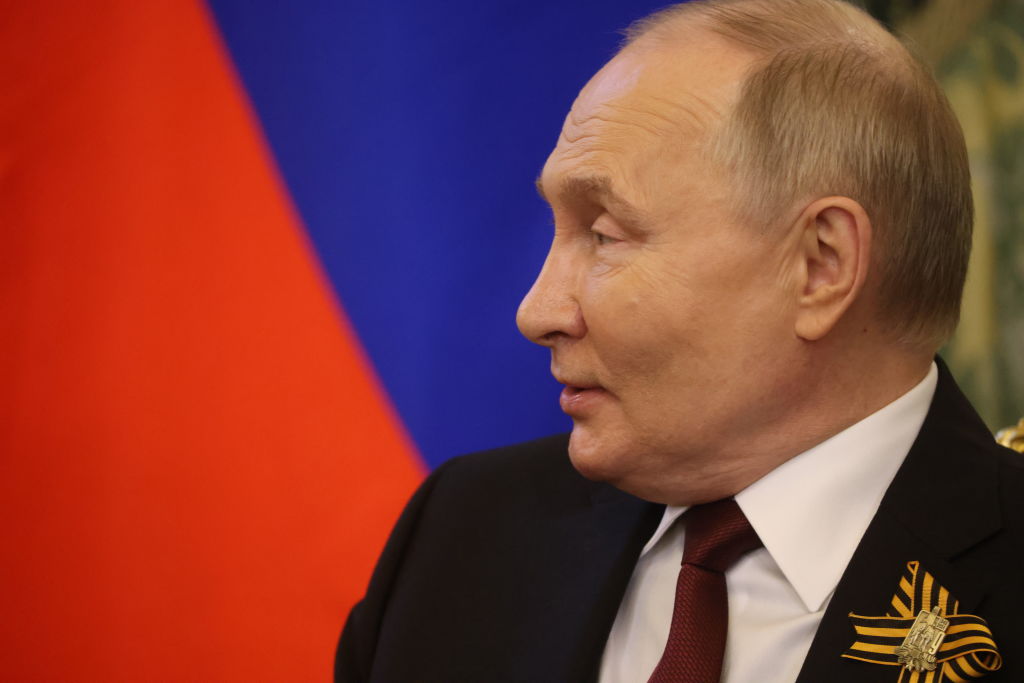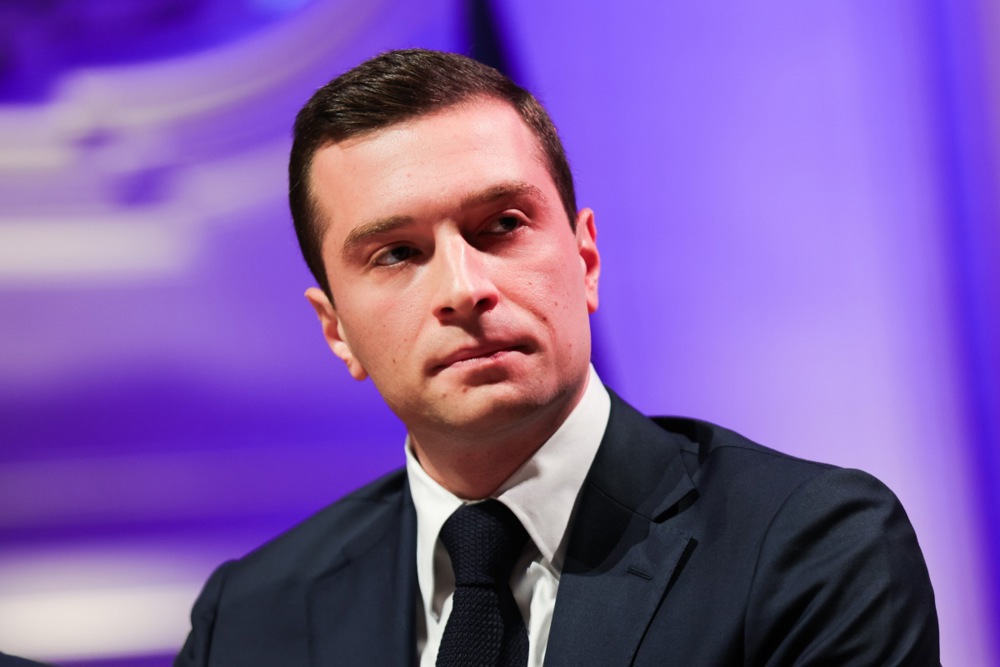“If you poke the Russian bear with a stick, don’t be surprised if he responds.” These words by Reform party leader Nigel Farage have launched a debate about Britain’s support for Ukraine, and how far its support should go. It is a debate that has been largely absent from the British political arena until now – strong support for Kyiv is the default position. Farage has been lambasted as a Putin apologist by figures from across the political spectrum, most vociferously by former Conservative prime minister Boris Johnson.
Some argue that Reform’s rise in the polls – which has become one of the key questions and talking points about the July 4 election – has been dented by Farage’s remarks. We will know soon enough. The fresh debate raises an interesting question. Why has the UK taken such a hawkish stance ever since Russia’s invasion of February 2022?
Prior to February 2022, many commentators had lambasted Britain’s political class for not being hawkish enough. In 2006 Russian defector Alexander Litvinenko had been poisoned in London with radioactive polonium-210 in an attack ascribed to Russian intelligence. Prime Minister Tony Blair then made the robust noises one might expect, but little substantively changed in Britain’s relationship with Russia. London had become too addicted to money from the Russian oligarchs who had congregated in London.
With the poisoning of Sergei and Yulia Skripal in Salisbury in 2018 with nerve agent Novichok, the response of the Theresa May government was stronger, although still much less than hawks demanded. (The Skripals survived, a homeless woman was less fortunate when her boyfriend discovered the abandoned perfume bottle that had been used to conceal the nerve agent). Those most critical of the Moscow regime argued that the UK would never robustly stand up to the Kremlin, as Russian money had just become too important to too many in London’s financial and political elite.
But this narrative collapsed with Russia’s invasion of Ukraine. Suddenly the business links no longer seemed to matter and the UK took perhaps the most hawkish stance of any country outside of Poland and the Baltics. Boris Johnson’s immediate and unequivocal support is the explanation. The champion of Brexit framed Kyiv’s struggle as a fight for national sovereignty. Ukraine was fighting for its independence and the newly fully sovereign UK had to do all in its powers to help that struggle. The Tory Brexiteers, pretty much without exception, followed this sovereigntist line.
And, for Kyiv’s sake, there was the happy coincidence that Labour leader Keir Starmer was desperate to prove how far he had changed the party since taking over from Jeremy Corbyn in 2020. Backing Ukraine to the hilt was a great way of displaying this.
Corbyn, from the far Left of the Labour party, was always willing to give the Kremlin the benefit of the doubt. Two of his closest political advisers, his special political advisor Andrew Murray and his director of strategy Seumas Milne, had cut their political teeth in something called Straight Left. This was ostensibly a Left-wing monthly trade union movement newspaper – with a miniscule circulation. In fact it was a pro-Soviet faction within the already pro-Soviet Communist Party fighting against any signs of reformism. In the vernacular of the extremely factional far Left, it was a Stalinist rag; a fairer description might be Brezhnevite.
Milne and Murray had similar well-connected upper class backgrounds, and rebelled against them to embrace the wilder shores of Marxism. Milne went on to have an illustrious career with The Guardian newspaper, rising to be its Comment Editor. Murray’s journalist endeavours were with the Communist Party’s Morning Star newspaper and the Soviet Novosti press agency. Where Murray made more of a mark was in the “peace” movement. He became one of the leaders of the Stop the War Coalition against the Iraq War.
When Russia first invaded Ukraine in 2014, Murray co-founded a group called “Solidarity with the Anti-Fascist Resistance in Ukraine,” i.e. British cheerleaders for Putin’s aggression.
Corbyn was unexpectedly elected leader of the Labour party in 2015. Murray and Milne then had their moment of influence. Milne left The Guardian to work for the new leader; Murray resigned his Communist party membership to do the same. In the Corbynite era the pair were extraordinarily influential within Labour, much more so than even members of the shadow cabinet.
When Corbyn’s reign came crashing down with Labour’s defeat in the 2019 election, the twosomes’ roles came to a rapid end.
After Russia’s full scale invasion in 2022, the Stop the War Coalition issued a statement broadly taking Russia’s side, or rather saying there should be a negotiated settlement “which recognises the right of the Ukrainian people to self-determination and addresses Russia’s security concerns” and that the West should not support arm Ukraine.
This statement was signed by Corbyn, who by that time had been thrown out of the parliamentary Labour party, another similarly excluded MP and 11 sitting Labour MPs. Starmer gave them a choice. They could keep their names on the statement or they could remain in the Labour party; they could not do both. The 11 withdrew their names from the statement.
The Labour party has since then unequivocally supported the Conservatives adamant backing for Ukraine. The debates which have occurred on Ukraine policy in nearly all of Europe have been absent from Britain’s political discourse – until now.
The only British newspaper to have strongly endorsed Farage’s remarks is the Communist Morning Star. Their headline: “PM and Starmer united for war: Leaders join forces to condemn Farage.” The story’s byline? None other than “political journalist,” as he now styles himself, Andrew Murray.






The 1999 EU elections delivered Brexit twenty years on – here’s why